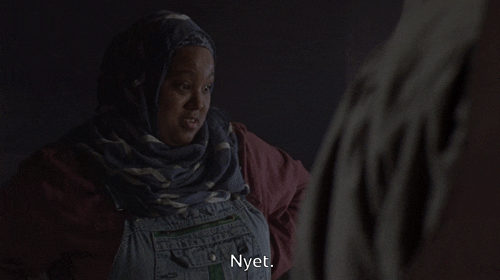Dealing with digital ghosts
This past ain't a blast

Ola, amigo/amiga. (Amigx? LOL) Welcome to Very Online, issue #5!
Something weird happened to me last week: I had a truly unexpected virtual visitor from way, way back.
The blasted past
Let’s backtrack a bit.
I was minding my own business, and - like everyone else - doing my best given a still-raging pandemic, long-term personal and health problems, the upcoming Philippine national elections (and all that mudslinging, digital warfare, and historical revisionism) that could bring us back to the murderous conjugal-dictatorship years, and then now a country invading another country.
What the fuck, World.
(BTW, if you're looking for a simple but thorough explanation for the Russian invasion of Ukraine, watch this video from RealLifeLore. Awesome work from sole creator Joseph Pisenti!)
Then came an email from LiveJournal, a free blogging service that I used heavily in my late teens to early twenties to express all my angst, anger, and drama. And of course, fill up all those juvenile questionnaires and memes!
I knew I had long deleted the two main blogs I had on there. So I didn’t know why I was getting this email, or why LJ still had my email address.
“Probably spam,” I said to myself.
But the preheader had already grabbed my attention: “You have received a virtual gift for your 17th anniversary on LiveJournal.” Huh?
Against my better judgment, I opened the damn email. It definitely wasn’t spam. It bore, in LiveJournal’s trademark light blue text and generic user icon, the name of a third account I had made to house my microfiction and creative-writing experiments.
See, I had enlisted a small group of friends to read them and give me their feedback in the comments section. Then I made a series of posts from February to November 2005, or until I got too busy or bored (or both) to keep it going. Finally, I abandoned it - and forgot about it so completely that when I came back to delete my other two LiveJournal accounts in the early 2010s, this one didn’t even cross my mind.
Until last week, that is. 17 years later, to be exact. Goddamn.
So I did the only logical thing: I regained access to this rogue account, and went through all the posts and comments stored on it.
The good parts
Sorting through a digital account that old was like going on a half-amusing, half-cringey deep dive into my former self. Oh look, here are the super-short stories I forgot I wrote (and how, where, when, and why!), some people I don’t call friends anymore, and a dead link to my short story that was published in February 2005 on the Philippine Daily Inquirer’s (now-defunct) “Expressions” section by a guy editor who would become my colleague a year later.
Take it away, Celine!
To be honest, I had fun on that little nostalgia trip. Back then, we blogged and made friends online just because we wanted to - not because it could make us money or earn us industry influence, or we needed... content.
Oh fuck, it’s the C-word.
In those days, we were the same people online as offline; no pretentiousness or performance was allowed. Those ultra-old LiveJournal entries showed me all the openness, earnestness, and honesty missing in most public/online interactions now.
Yeah, I wanted to hug my younger self so, so badly.
It was also a good look at how I wrote before I began doing it for a living and going through the grad-school/MFA grind. For example, I think it’s hilarious that I experimented with an all-narration short story in 2005, then turned around and did an all-dialogue story in 2017.
My writing style and voice definitely changed, and I barely recognized what I published. Back then I wanted to imitate Neil Gaiman’s profound/philosophical tone or Chuck Palahniuk’s outer bluntness + inner rage. Now? Haha, no thanks. I’d rather refine what I have, tyvm.
The bad parts
As great as it was to reminisce, having to confront something I thought was long dead and buried made me want to kill and bury it ASAP. The writing was bad enough that my initial reaction was I should burn it (if it had a physical form), then store the ashes in a trunk and sink that into the West Philippine Sea.
My mindset now is also quite different from that of Young Me. Young Me would say my entire life must be documented and preserved for posterity, so I must keep everything where it is so people I love and care for can see. Back then, a life lived publicly is a life lived well.
Today Me will counter that by saying not everything (or everyone) is important and worth remembering, and I must always be highly selective about who and in what way(s) they should have free and open access to me and my life. It is perfectly OK to keep most things low-key and quiet; to not react instantly to whatever goes on online and offline (or not react at all if I’m not up to it or I don’t know much about it); to let people be and not mock them for being who they are; and to cut people out of my life if they are intentionally offensive and abusive and/or support people who are corrupt, deceitful, plunderous, and murder-happy. The only final approval or validation I will ever need in my life is my own, and I should keep my pride and ego in check so that I never make others think they need my approval for them to live.
The P-word
This change in mindset isn’t just about getting older and becoming more ‘mature’ (LOL whut). It's also about privacy.
Going digital offers so much convenience. But it’s also easy to forget that all of our online activity is recorded, stored, and sold as identifiable and actionable data. At ‘best,’ we are served annoying ads on every site and social media service we use. At worst, our entire lives are upended when our online and financial accounts are hacked, our old posts are resurfaced and we get canceled, and our physical safety and welfare are compromised and threatened (a.k.a. doxing).
TL;DR: It’s not enough to keep your accounts private and/or accessible to certain groups of people. Always assume that everything you do and publish online, especially on free services, can and will be made available to everyone else one day - and certainly without your consent.
That’s partly why I deleted those old LiveJournal accounts. I realized I had too many free accounts strewn across the internet, and all of them were potentially major security and privacy risks.
Clean your digital house
I’ve offered most of these tips before in past published articles, but I’m rehashing them today because they’ll always be important.
Use a password manager
I recommend KeePass and its variants (KeePassX, KeePassXC, KeePassDroid, and KeePassium). They’re all free, fairly easy to use, generate and paste complex passwords for you, and use local copies of your password databases. That means if you do proper account security, no one else will have access to your database but you.
Other good alternatives: LastPass, 1Password, Keeper, RoboForm, Sticky Password. Features and pricing vary. Do your research.
Once you’ve chosen a password manager, download the desktop and mobile apps for them; and list down every account you have and remember, even those you forgot the password to.
Tip: Search through all of your email inboxes for forgotten or rogue accounts. Those old account notifications will come in handy!
Be ruthless
You can then do two things: tighten up security on every account, or delete them.
By tightening up security, I mean doing the following:
Change all your passwords to longer and more complex ones (your password manager most likely has a password generator; use it!),
Activate two-factor authentication (and use hardware if you can!),
Download your backup codes, and
Revoke or deactivate old devices that still have login access to your accounts.
One benefit of knowing exactly what accounts you have and where is that you’ll also see exactly how many you don’t actually need. In that case, do what I did and shut that shit down. Go to each unused/unneeded account and delete it outright, or ask customer service to delete them for you.
Some services will resist, though. They earn money through your data, and they will never let you go if they can help it. Account Killer and Just Delete Me can help you with websites that make it unnecessarily difficult for you to delete your accounts.
Get into new habits
Set up alerts for compromised accounts. I’ve been using Have I Been Pwned? (HIBP) for many years now. This free service tells me whether my email and phone number have been accessed in any data breach. Creator Troy Hunt also provides thorough explanations for each breach, and when and how they occurred. At the very least, it'll alert you to change your passwords and up your security measures.
Never reuse passwords. If one account gets hacked, having different passwords lessens the risk of your other accounts getting compromised.
Never use free Wi-Fi, either. Self-explanatory.
Use virtual private networks or VPNs. They’re worth every peso. If you need help choosing VPN providers, read this great guide.
Always back up or archive your data. Think of it as diligent digital housekeeping. I do this at the start of every month for both my laptop and for my most heavily used accounts. Put it on your calendar and set alarms so you don’t forget.
Automate it if you can. I recommend IFTTT, or If This Then That.
If you don’t use it, get rid of it. If you haven’t accessed those accounts in three to six months to a full year, delete them. You probably won’t use them again.
If you don’t do Google searches on yourself, better do it now. Remember those “juvenile questionnaires and memes” I mentioned earlier? You may have given out private information such as your full/birth name, complete birth date, birthplace or current city of residence... Basically, all your vital details for security questions are now online and widely available for bad actors. You can ask Google to remove details that can be a security threat, and you can also set up Google Alerts if ever something else pops up.
Plan for the future
Much like how people have executors for real-life matters (particularly the after-death part), it’s time to consider who will take over your accounts when you’re gone. And major online services are figuring that part out as well.
Google has an Inactive Account Manager feature, where you can decide what happens to your Google account(s) after you stop using it for a certain time period. You can also designate up to 10 people to be notified and have access to your account(s) and data afterward, and if you want your account(s) deleted by Google.
On Facebook, you can choose a Legacy Contact to manage your Memorialized account after your passing. You can also request Facebook to delete your account altogether. Set your preference over on your Settings page, under the General tab.
Instagram offers the same options as Facebook (memorialization or account deletion), minus the Legacy Contact.
The same goes for Twitter, although Twitter offers limited access to accounts of an incapacitated user.
Like the services above, Dropbox has some strict guidelines for digital-account caretakers. But I both like and loathe this one:
A valid court order establishing that it was the deceased person’s intent that you have access to the files in their account after the person passed away, and that Dropbox is compelled by law to provide the deceased person's files to you
Not all online services have after-death guidelines, though. So look into each service and see what they can do for you and the person(s) who will look after your account(s).
Huling hirit
As for that surprise LiveJournal account, I kept it alive for a few days. Then I deleted it as well. That’s one less thing to worry about overall.
Also: I just learned that LiveJournal was bought by a Russian media company, and its servers were transferred to Russia in the mid-’10s.







LiveJournal! That's a word I haven't heard in a long time hah. I think I'll check if mine still exists, thanks for the reminder
natawa ako kasi sa isang draft ko "i've been minding my business" din opener ko wahahahahah